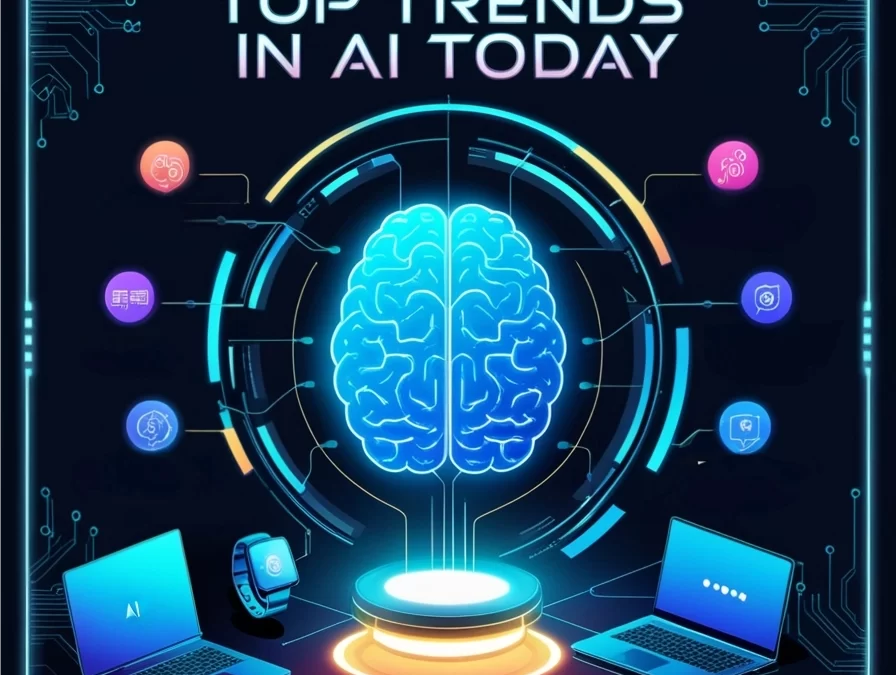Based on the search results and current trends in AI, here are the top five things organizations need to know about the trajectory of AI and its application in businesses:
1. AI adoption is accelerating rapidly across industries
Businesses have experienced a significant surge in the adoption of AI in recent years and are poised to continue its rapid expansion. Between 2015 and 2019, the number of companies leveraging AI services skyrocketed by 270%[1]. About 35% of companies are utilizing AI services, which is expected to grow substantially [1]. The global AI market is on a trajectory of nearly 40% compound annual growth, indicating widespread and accelerating adoption across sectors[1].
2. AI is becoming a top strategic priority for most companies
Around 4 in 5 companies now consider AI a top priority in their business strategy[1]. This reflects the growing recognition of AI’s potential to drive innovation, efficiency, and competitive advantage. As AI capabilities expand, businesses increasingly view it as essential for future success rather than an optional technology.
3. AI is expected to boost productivity and revenue significantly
AI technology is projected to generate substantial economic value in the coming years. It’s estimated that AI could increase revenue by over $15 trillion by the end of the decade, potentially boosting local economies’ GDP by an additional 26%[1]. On an operational level, AI is expected to improve employee productivity by approximately 40% by 2035[1]. These promising projections underscore the transformative potential of AI, which is set to revolutionize various business functions and pave the way for a more productive and profitable future.
4. AI applications are diversifying beyond traditional tech sectors
While tech giants are at the forefront of AI development, the technology is rapidly permeating diverse industries. From healthcare and finance to retail and manufacturing, AI is solving real-world problems and enhancing operations[2]. For instance, 80% of retail executives expect their businesses to adopt AI automation by 2025[1]. This trend indicates that AI is no longer confined to tech-centric companies but is becoming integral to businesses across the economic spectrum, broadening its impact and potential.
5. Continuous transformation and scaling capabilities are crucial
As AI technology evolves rapidly, businesses must adopt a mindset of continuous transformation rather than viewing AI adoption as a one-time project[4]. Successfully leveraging AI requires implementing the technology and building the organizational capabilities to scale and adapt as new developments emerge. This underscores the urgent need for businesses to develop robust data infrastructure, cultivate AI talent, and create flexible processes that can evolve with technological advancements, highlighting the importance of staying ahead in the AI race.
As an AI speaker and author, I believe that AI is on the brink of becoming a fundamental aspect of business operations across industries. However, successful adoption, scaling, and continuous evolution of AI capabilities require a strategic approach beyond simply implementing AI tools. It encompasses organizational culture, talent development, and a long-term vision for digital transformation. This long-term vision involves not only adopting AI but also integrating it into the overall digital strategy of the business, aligning it with the company’s goals and values, and continuously updating it to keep pace with technological advancements.
Citations:
[1] https://explodingtopics.com/blog/ai-statistics
[2] https://www.datamation.com/featured/ai-companies/
[3] https://www.stash.com/learn/top-ai-companies/
[4] https://www.mckinsey.com/capabilities/mckinsey-digital/our-insights/ten-unsung-digital-and-ai-ideas-shaping-business
[5] https://www.reddit.com/r/singularity/comments/18dcv3d/which_big_5_tech_company_will_dominate_ai_in_the/







